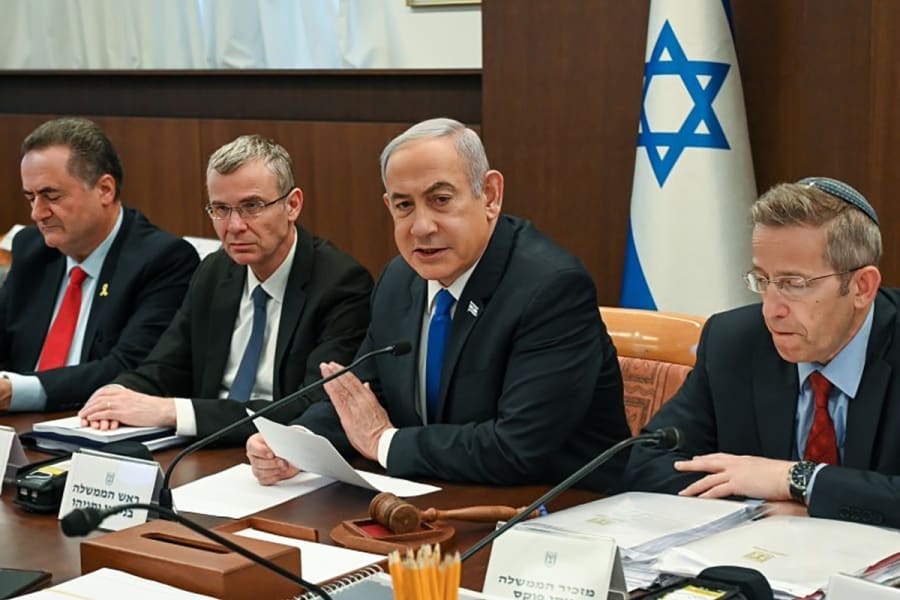Israeli gov’t orders IDF not to completely withdraw from southern Lebanon
LAF ineffective in deploying and pushing out Hezbollah forces, IDF says

The Israeli government ordered the IDF on Thursday evening not to complete its withdrawal from southern Lebanon, contrary to the original terms of the ceasefire agreement, several Israeli media outlets reported.
The terms of the ceasefire deal had set a 60-day deadline, that will expire on Sunday, for the IDF to pull its troops from Lebanon.
According to the report, IDF commanders were told that Israel continues to negotiate with the new U.S. administration to receive its approval to extend the deadline by several days to weeks.
Opposition leaders Benny Gantz and Avigdor Liberman agreed with the government's reported decision on Friday morning and called for the IDF to remain in Lebanon.
“The IDF must not leave the buffer zone in Lebanon,” stated National Unity party chairman Benny Gantz. “The IDF must continue to intensify operations against any violation by Hezbollah – minor or serious. We must insist on the full implementation of the agreement by the Lebanese government.”
“We must insist on the security of the residents of the north and ensure that the threat to the northern communities is not re-created. Otherwise, we have learned nothing from October 7,” he wrote on 𝕏.
Yisrael Beytenu head Liberman charged that Lebanon had violated the agreement. “There is no real deployment of the Lebanese army along the border, and it is unable to control Hezbollah or disarm it. A withdrawal under these conditions is a serious mistake that endangers the residents of the north,” he said.
The decision not to withdraw was reportedly made during a security cabinet meeting on Thursday evening, with several media outlets initially reporting that the cabinet hadn’t yet reached a decision.
Israel argues that the Lebanese Armed Forces (LAF), which is supposed to fill the vacuum left by the retreating IDF troops, has not shown the ability to effectively destroy Hezbollah assets that are reported to it by Israel according to the ceasefire enforcement mechanism.
השמדת תוואים תת-קרקעיים, החרמת מצבורי אמצעי לחימה ומשגרי רקטות: תיעודים חדשים מפעילות צוות הקרב החטיבתי 769 בדרום לבנון
— צבא ההגנה לישראל (@idfonline) January 24, 2025
לכל הפרטים >> https://t.co/f5VJmEzNrA pic.twitter.com/Xsf6TPx20C
Kan News cited IDF sources who said they have identified efforts by the LAF to try and establish control over the area but it “needs more time to strengthen.”
The main area from which the IDF hasn’t yet withdrawn is the eastern sector between the town of Mais al-Jabal and Mount Dov, which overlooks large parts of Israel’s Galilee “panhandle,” including the city of Kiryat Shmona and several other towns.
A senior official told Israeli media before the cabinet meeting that he estimated the IDF would remain in some areas, but only with coordination with the U.S. administration.
On Thursday, Army Radio reported that somewhat surprisingly, the Trump administration opposes Israel’s request to extend the deadline and expects it to fulfill the terms of the agreement. However, Israel’s outgoing ambassador to the U.S., Michael Herzog, told the outlet that he believes “an understanding” would be reached.
According to a U.S. handout following the first call between Israel’s Foreign Minister Gideon Sa’ar and new U.S. State Secretary Marco Rubio on Thursday, he praised Israel’s “ongoing efforts to implement” the ceasefire with Hezbollah, indicating talks about the issue were continuing.
Over the past two months, Israel has repeatedly highlighted, and attacked, Hezbollah’s ceasefire violations, while complaining about the LAF’s slow and ineffective deployment.
IDF officials told Walla News that the LAF is failing to effectively combat and push Hezbollah operatives out of the areas it controls.
השמדת תוואים תת-קרקעיים, החרמת מצבורי אמצעי לחימה ומשגרי רקטות: תיעודים חדשים מפעילות צוות הקרב החטיבתי 769 בדרום לבנון
— צבא ההגנה לישראל (@idfonline) January 24, 2025
לכל הפרטים >> https://t.co/f5VJmEzNrA pic.twitter.com/Xsf6TPx20C
Reserve officers told Walla’s military correspondent Amit Bohbot that to withdraw now would be a serious mistake, pointing to the numerous large weapons stores that are still being discovered in Lebanon.
The IDF on Friday said that during operations of the Paratroopers Brigade in the Salouki Valley last week, several new Hezbollah bunkers were discovered.
The underground infrastructure was intended as long-term living quarters for Hezbollah terrorists and was investigated and destroyed.
During other operations, a weapons cache was found hidden in a mosque that contained hundreds of mortar grenades, explosive chargers, rockets and other weapons. The mosque also contained a pick-up truck mounted with a heavy anti-air machine gun.
Also last week, soldiers of the Golani Brigade found several trucks mounted with heavy rocket launchers, as well as more weapon depots that included large numbers of rockets, launchers, shoulder-fired missiles, mortar grenades, explosive charges, and other equipment.

The All Israel News Staff is a team of journalists in Israel.
You might also like to read this:
















